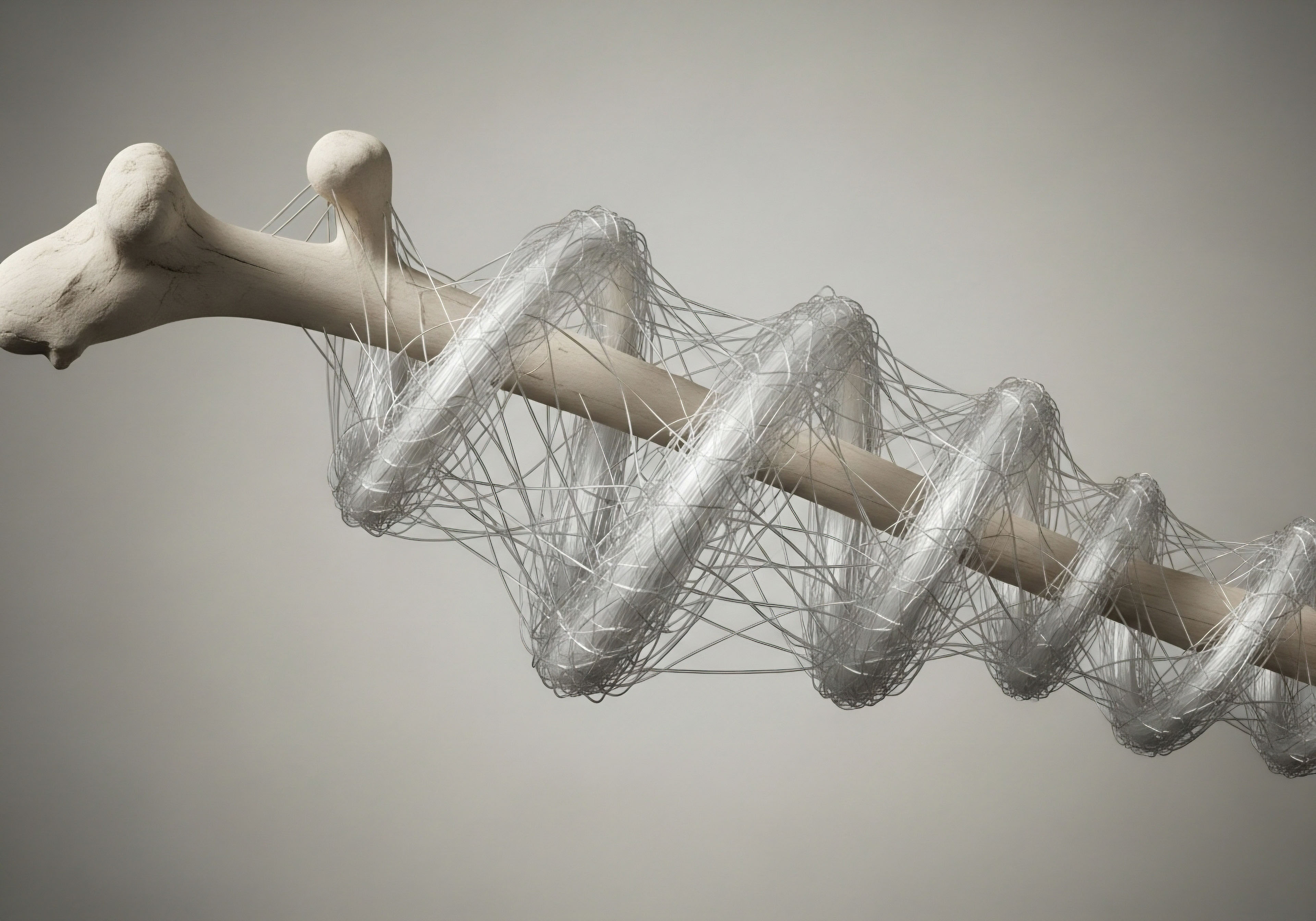

Fundamentals
The feeling is deeply familiar to many. A persistent fatigue that settles into your bones, a brain fog that clouds your thoughts, and a sense of being at odds with your own body. You may have been told your thyroid labs are “normal,” yet the lived experience of your symptoms tells a different story.
This is a common starting point in the journey toward understanding thyroid health. Your body is communicating a state of distress, and learning its language is the first step toward reclaiming your vitality. The central question of whether hormonal optimization can truly alter the course of thyroid autoimmunity begins with appreciating the thyroid’s role within a much larger, interconnected system.
Your thyroid gland, located at the base of your neck, functions as the primary regulator of your body’s metabolic rate. It dictates the speed at which every cell operates, from your brain to your heart to your digestive tract. This regulation is managed through a sophisticated feedback loop known as the Hypothalamic-Pituitary-Thyroid (HPT) axis.
The hypothalamus in your brain releases Thyrotropin-Releasing Hormone (TRH), which signals the pituitary gland to release Thyroid-Stimulating Hormone (TSH). TSH then instructs the thyroid to produce its hormones, primarily Thyroxine (T4) and a smaller amount of Triiodothyronine (T3). When the body has enough T3 and T4, this system sends a signal back to the brain to slow down TSH production, maintaining a delicate equilibrium.
A state of thyroid autoimmunity represents a breakdown in the immune system’s ability to recognize its own tissue.

Understanding Autoimmune Thyroid Disease
Thyroid autoimmunity, most commonly Hashimoto’s thyroiditis, occurs when the body’s immune system mistakenly identifies the thyroid gland as a foreign invader. It produces antibodies, such as Thyroid Peroxidase (TPO) antibodies, which attack the glandular tissue. This assault disrupts the thyroid’s ability to produce hormones efficiently, leading to the symptoms of hypothyroidism.
The presence of these antibodies is a direct indicator of an ongoing autoimmune process. This process is a conversation between your immune system and your endocrine system. The immune attack is the direct cause of the gland’s destruction, and the resulting hormonal deficiency is the source of the symptoms.
The initial stages of this condition can be subtle. You might notice changes in your energy, mood, skin, or weight that seem disconnected. These are the early signals of a system under strain. Appreciating this reality is essential.
The symptoms are real, they are biologically driven, and they are pointing toward a deeper systemic imbalance that extends beyond the thyroid gland itself. The goal of a truly effective wellness protocol is to address the conditions that allow this autoimmune process to persist.

What Does Systemic Balance Mean for Your Thyroid?
The endocrine system is a network of glands that communicate using hormones. The thyroid does not operate in isolation. Its function is influenced by signals from the brain, the status of your sex hormones, the activity of your adrenal glands, and even the health of your gut microbiome.
When one part of this network is out of balance, it creates ripple effects throughout the system. For instance, prolonged stress can alter cortisol levels, which in turn can affect how your body converts the inactive T4 hormone into the active T3 hormone.
Similarly, the decline in estrogen during perimenopause and menopause has been shown to impact thyroid function and receptor sensitivity. This interconnectedness is the very foundation upon which hormonal optimization strategies are built. The aim is to create a biological environment where the immune system is no longer perpetually triggered and the thyroid can function optimally within a balanced endocrine network.


Intermediate
Advancing beyond the foundational understanding of thyroid autoimmunity requires a clinical perspective on the interplay between different hormonal systems. The question of reversing the autoimmune process moves from a theoretical possibility to a strategic objective grounded in biochemical recalibration.
Hormonal optimization protocols are designed to correct imbalances in key areas like sex hormones and growth factors, which can secondarily modulate the immune response and support thyroid function. This is accomplished by viewing the body as a whole, integrated system, where targeted interventions can restore equilibrium.
The standard of care for hypothyroidism resulting from Hashimoto’s is thyroid hormone replacement therapy, typically with levothyroxine (T4). This approach directly addresses the hormone deficiency, and for many, it is effective at normalizing TSH levels and alleviating symptoms. A subset of individuals, however, continue to experience significant symptoms despite having lab values that fall within the conventional “normal” range.
This clinical reality points to a more complex issue. The problem may lie in the conversion of T4 to the active T3 hormone, cellular receptor sensitivity, or the persistent inflammation driven by the underlying autoimmune condition. Addressing these factors requires a more comprehensive approach.

The Critical Role of Sex Hormones
The endocrine system is deeply interconnected. The function of your thyroid is directly influenced by the status of your sex hormones, namely estrogen and testosterone. These hormones do more than govern reproductive health; they are powerful modulators of immune activity, inflammation, and cellular energy production.
In women, estrogen plays a significant role. Estradiol, the primary form of estrogen, is necessary for maintaining the health of thyroid hormone receptors. When estrogen levels decline during perimenopause and menopause, thyroid function can be compromised. This hormonal shift can also alter the gut microbiome, which is a major regulator of the immune system, potentially exacerbating autoimmune conditions like Hashimoto’s.
For some women, optimizing estrogen levels, often alongside progesterone, can be a key component of a broader strategy to support thyroid health and calm the autoimmune response.
In men, low testosterone is associated with increased levels of systemic inflammation. Testosterone has immunomodulatory properties, and maintaining optimal levels can help create a less inflammatory internal environment. For a man with Hashimoto’s and concurrent low testosterone, a Testosterone Replacement Therapy (TRT) protocol could be a crucial part of the overall management plan. By restoring testosterone to a healthy physiological range, the protocol aims to reduce the systemic inflammation that may be contributing to the autoimmune thyroid attack.

Can Optimizing Hormones Quiet the Immune System?
The central hypothesis is that by restoring balance to the broader endocrine system, we can reduce the triggers that perpetuate the autoimmune attack on the thyroid. Hormonal optimization is a method of systemic stabilization. When sex hormones are balanced, when stress hormones are managed, and when growth hormone pathways are supported, the immune system itself can begin to down-regulate its inflammatory posture.
This is a shift away from simply replacing the final product (thyroid hormone) and toward correcting the systemic imbalances that contribute to the gland’s destruction in the first place.
Effective hormonal optimization considers the full symphony of endocrine signals, not just a single instrument.
The following table outlines key hormones and their potential influence on thyroid health and autoimmunity, providing a clearer picture of this systemic interplay.
| Hormone/System | Influence on Thyroid Health | Potential Impact of Optimization |
|---|---|---|
| Estrogen (Estradiol) |
Supports thyroid gland function and is necessary for the sensitivity of thyroid hormone receptors. Imbalances can affect T4 to T3 conversion. |
In women, restoring optimal estradiol levels may improve thyroid hormone utilization and support glandular health. |
| Testosterone |
Has anti-inflammatory and immunomodulatory properties. Low levels are associated with increased systemic inflammation. |
In men and women with deficiencies, restoring optimal levels may help reduce the inflammatory burden contributing to autoimmunity. |
| Cortisol |
Chronic high levels (from stress) can inhibit the conversion of T4 to the active T3 hormone and suppress overall thyroid function. |
While not directly replaced, protocols that reduce physiological stress can help normalize cortisol patterns, supporting better thyroid hormone conversion. |
| Growth Hormone Peptides |
Growth hormone pathways are involved in tissue repair and metabolism. Peptides like Sermorelin or Ipamorelin stimulate the body’s own GH production. |
May support cellular repair and metabolic health, creating a more favorable environment for thyroid function and potentially aiding in tissue recovery. |

Clinical Protocols in Practice
A personalized wellness protocol moves beyond a single medication. It is a multi-faceted strategy tailored to the individual’s unique biochemistry, revealed through comprehensive lab testing.
- Comprehensive Lab Analysis ∞ The process begins with a detailed assessment that goes beyond TSH. It includes Free T4, Free T3, Reverse T3, and thyroid antibodies (TPO and TgAb). It also evaluates a full panel of sex hormones (Total and Free Testosterone, Estradiol, Progesterone) and inflammatory markers.
- Thyroid Hormone Optimization ∞ For some individuals, levothyroxine (T4) alone is insufficient. A combination therapy that includes liothyronine (T3) may be used to ensure adequate levels of the active hormone are available to the cells. The goal is to optimize lab values while resolving clinical symptoms.
- Sex Hormone Balancing ∞ Based on lab results and symptoms, a protocol is designed. For men, this might be weekly Testosterone Cypionate injections combined with agents like Gonadorelin or Anastrozole to manage the body’s hormonal response. For women, it could involve low-dose Testosterone Cypionate, bioidentical estradiol, and progesterone, tailored to their menopausal status.
- Peptide Therapy ∞ For specific goals related to tissue repair or metabolic health, peptides like Ipamorelin/CJC-1295 may be incorporated. These are signaling molecules that encourage the body’s own restorative processes.


Academic
An academic exploration into the potential reversal of thyroid autoimmunity through hormonal optimization requires a deep dive into the molecular cross-talk between the endocrine and immune systems. The central thesis posits that specific hormones, particularly gonadal steroids like testosterone and estradiol, are not merely passive bystanders but active regulators of immune tolerance.
The progression of autoimmune thyroiditis (AITD) can be viewed as a failure of this regulatory capacity, leading to a sustained attack on thyroid antigens. Therefore, restoring physiological levels of these hormones is a therapeutic strategy aimed at re-establishing immune homeostasis.
The immune system’s ability to distinguish self from non-self is a dynamic process. In AITD, this self-tolerance is broken. T-lymphocytes, key players in cell-mediated immunity, become sensitized to thyroid proteins such as thyroperoxidase (TPO) and thyroglobulin (Tg).
This activation leads to both direct cytotoxic damage to thyroid follicular cells and the stimulation of B-lymphocytes to produce autoantibodies. The question is what permits this breakdown in tolerance. Evidence points toward a complex interplay of genetic predisposition and environmental triggers, all mediated by the body’s internal biochemical milieu, in which hormones are principal actors.

Immunomodulatory Actions of Gonadal Steroids
Testosterone and estradiol exert profound effects on the development, differentiation, and function of immune cells. Their actions are mediated primarily through nuclear receptors expressed in tissues of the immune system, including the thymus, spleen, lymph nodes, and on circulating lymphocytes.
Testosterone generally exhibits immunosuppressive and anti-inflammatory properties. Mechanistically, it can promote the differentiation of T-helper cells toward a Th2 phenotype, which is associated with humoral immunity, while suppressing the pro-inflammatory Th1 phenotype responsible for cell-mediated cytotoxicity.
Androgen receptors have been identified on T-lymphocytes, and their activation can modulate cytokine production, decreasing inflammatory cytokines like IFN-γ and TNF-α. This provides a molecular basis for the observation that low testosterone in males is often correlated with higher levels of inflammatory markers, creating an environment conducive to autoimmune activity.
The role of estrogen is more complex and appears to be concentration-dependent. At physiological levels typical of pre-menopausal females, estradiol can enhance immune responses, which may explain the higher prevalence of autoimmune diseases in women. However, at the very high concentrations seen during pregnancy, estrogen becomes powerfully immunosuppressive, contributing to the maternal-fetal tolerance.
This dual role suggests that the goal of hormonal therapy is achieving a state of balance. For post-menopausal women, restoring estradiol to a healthy physiological level may be crucial for maintaining the integrity of thyroid receptors and modulating the immune system away from a pro-inflammatory state.

What Is the Role of the HPG Axis in Immune Tolerance?
The Hypothalamic-Pituitary-Gonadal (HPG) axis, which governs the production of sex hormones, is intimately linked with the Hypothalamic-Pituitary-Thyroid (HPT) axis and the immune system. Dysfunction in one axis can precipitate imbalances in the others. For instance, the inflammatory cytokines produced during an autoimmune response in the thyroid can suppress the HPG axis, leading to lower testosterone production.
This creates a vicious feedback loop ∞ autoimmunity suppresses testosterone, and low testosterone further permits inflammation. A hormonal optimization protocol that exogenously restores testosterone seeks to break this cycle, reintroducing a key immunomodulatory signal that the body is no longer able to produce sufficiently.
Restoring endocrine balance is a direct intervention aimed at recalibrating the biochemical signals that govern immune cell behavior.
The following table details specific immune cell interactions with sex hormones, providing a more granular view of the mechanisms at play.
| Immune Cell Type | Effect of Testosterone | Effect of Estradiol |
|---|---|---|
| Th1 Lymphocytes |
Suppresses differentiation and proliferation. Reduces production of pro-inflammatory IFN-γ. |
Can promote Th1 responses at lower concentrations, contributing to cell-mediated inflammation. |
| Th2 Lymphocytes |
Promotes a shift toward a Th2 response, which is generally less destructive in organ-specific autoimmunity. |
Enhances Th2 responses and antibody production, which can be pathogenic in certain conditions. |
| Regulatory T-cells (Tregs) |
Evidence suggests testosterone may support the function of Tregs, which are critical for maintaining self-tolerance. |
May enhance Treg function at high (pregnancy-level) concentrations, but its effect at physiological levels is less clear. |
| B-Lymphocytes |
Can inhibit B-cell proliferation and antibody production, potentially lowering autoantibody titers over time. |
Generally enhances B-cell activation and antibody production, a key factor in the gender bias of autoimmunity. |

Peptide Therapy and the Future of Tissue Regeneration
While hormonal optimization aims to quell the autoimmune attack, peptide therapy represents a frontier focused on repair and regeneration. Peptides are short chains of amino acids that act as precise signaling molecules.
- Thymosin Alpha-1 ∞ This peptide is known to modulate the immune system, particularly by enhancing T-cell function. In the context of autoimmunity, its role would be to help restore a more balanced and tolerant T-cell population.
- BPC-157 ∞ Known as Body Protective Compound, this peptide has demonstrated systemic healing properties in preclinical studies. Its potential application in AITD would be to promote the repair of thyroid tissue damaged by chronic inflammation.
- Growth Hormone Secretagogues (e.g. Ipamorelin/CJC-1295) ∞ By stimulating the natural release of growth hormone, these peptides support systemic metabolic health and cellular repair processes. A healthier metabolic state reduces overall systemic stress, which is a key contributor to immune dysregulation.
The academic view of reversing thyroid autoimmunity is one of integrated, systems-level intervention. It involves interrupting the inflammatory cycle through sex hormone modulation while simultaneously providing the biological resources for tissue repair and immune re-education through targeted peptide therapies. This approach treats the condition as a systemic regulatory failure, and the solution lies in restoring the body’s own homeostatic mechanisms.

References
- Jonklaas, Jacqueline, et al. “Optimal Thyroid Hormone Replacement.” Endocrine Reviews, vol. 35, no. 3, 2014, pp. 466-503.
- Gersh, Felice. “Thyroid & Menopause ∞ How changing hormones affect thyroid function.” YouTube, 2 May 2024.
- Peterson, Sarah J. et al. “Optimal Thyroid Hormone Replacement Dose in Immune Checkpoint Inhibitor-Associated Hypothyroidism Is Distinct from Hashimoto’s Thyroiditis.” Thyroid, vol. 32, no. 5, 2022, pp. 496-504.
- “Normal Thyroid Hormone Levels.” UCLA Health, Division of Endocrine Surgery, Accessed 2024.
- “My Doctor Says My Thyroid is Normal! Why Optimizing Your Thyroid Matters.” Biote, 11 Dec. 2022.

Reflection

A New Perspective on Your Personal Biology
The information presented here offers a detailed map of the complex biological territory governing thyroid health. It connects the symptoms you feel to the intricate communication network operating within your cells. This knowledge is the starting point.
Understanding the ‘why’ behind your experience ∞ the interplay of hormones, the mechanics of the immune system, and the pathways of inflammation ∞ transforms you from a passenger into the driver of your own health journey. The path toward wellness is a personal one, built on a foundation of deep biological understanding and guided by personalized clinical strategies. Your body has an immense capacity for regulation and repair. The journey is about creating the optimal conditions to unlock that potential.



